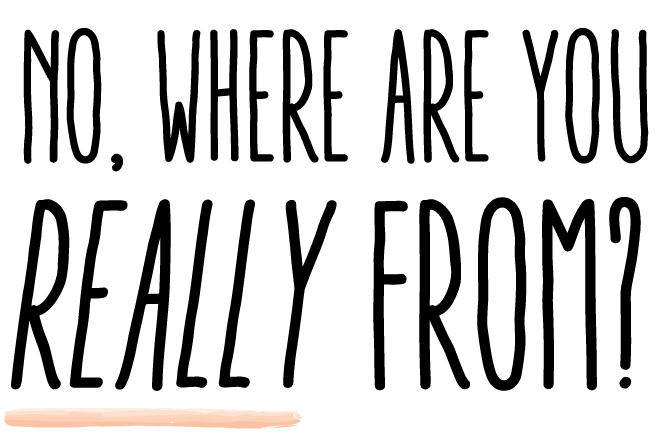
“Where are you from? No, where are you really from?” It’s a small question that gets asked every day. The question can be off-putting to some people and there’s a reason why: It’s personal. It can make people on the receiving end feel like they really don’t belong. It can be a harmless ask, but it often depends on the context and who’s asking.
About 2,000 people shared their experiences with us on social media with #whereimreallyfrom. From a woman asked about her ethnicity at a job interview to a man told to go back to his own country (he’s American), the experiences are as diverse as the people who shared them. Here are some of their many stories, as told in their own words.
These responses have been edited for length and clarity.
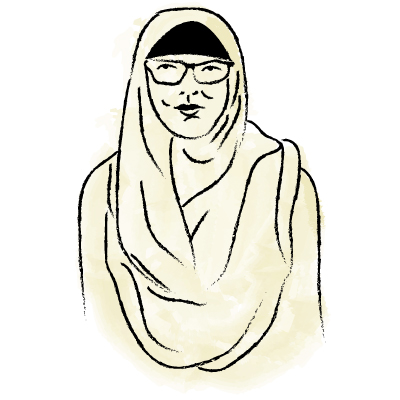

Kirsten Douglass, 25
Cairo, Egypt
I frequently hear the question "where are you really from?" although it has nothing to do with my race or ethnicity and everything to do with people's assumptions and negative stereotypes. I'm a white Midwestern American woman who is also a Muslim convert who wears a hijab. I get the question from both sides, from other white Americans and from members of the Muslim community, both in the United States and abroad.
This question has always bothered me because it makes me question my own belonging. I was an American first and became Muslim later. I thought that made me an American. But other people don't see it that way (as I'm often reminded by the more aggressive version of this sentiment: "Go back to where you came from"). I am often pressured – explicitly or implicitly – to choose between these two identities: my Americanness and my Muslimness. I never felt like the two were incompatible, but I guess other people do.
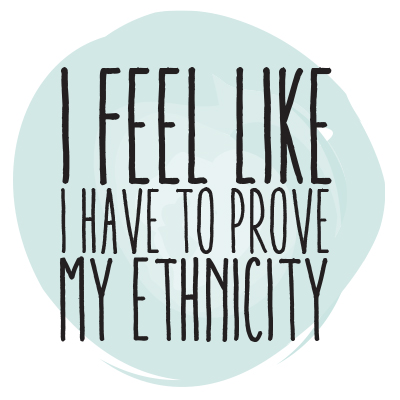

Michelle Tabencki, 34
Los Angeles
I am half black, half Polish but I really look Latina. I find that I have to defend both my black side and my Polish side when people ask me what I am. I feel that I have to prove I am Polish by speaking a few Polish words! While I think people are just genuinely curious, it feels like I have to prove that I am human. There are times when I know what people are asking but do not give up that information because I want them to ask me about myself and not figure out what category to put me in.
Mixed people have had to struggle with this for a long time and it is really hard to describe this to others. That is why I think it is so great that people like Kamala Harris are in the spotlight. Regardless of politics, she represents a mixed-race person who is in a powerful position trying to make her mark on the world. And I hope that she does not have to declare her race the way President Obama had to. Obama had to "prove" to black people that he is black. He is mixed race and that does not mean he does not love his black side, but he also has to love his white side. I hope more discussions like this are put to the forefront.
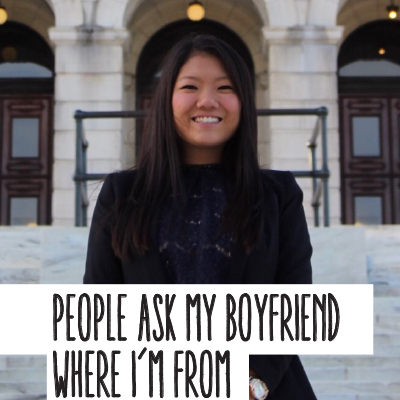

Photo courtesy Angie Kim
Angie Kim, 23
Newport, Rhode Island
I am an immigrant from South Korea who grew up in New Hampshire and am now a grad student in Rhode Island. Living in two states with a dominant Caucasian population, it seems like men asking me where I am from is supposed to be some form of flattery, as if telling people I am from New Hampshire isn't a satisfying answer. Though I am an immigrant, I was 2 years old when I came to the United States and grew up with the American culture and values. Therefore, I consider myself a true American.
Quite often, men have approached me telling me that they have "never been with an Asian before" and ask where I am really from. I try to be patient and carefully choose my words when responding so I am not entertaining the other person, but educating them on how to change the way they communicate with people, especially minorities. At the age of 23, I am pretty numb to racist remarks, but anxiety and embarrassing notions still consume me when episodes like these occur, which quite frankly happen very frequently. Even my Caucasian boyfriend gets asked where I am really from, sometimes right in front of me, as if I cannot understand English. It is baffling and exhausting.
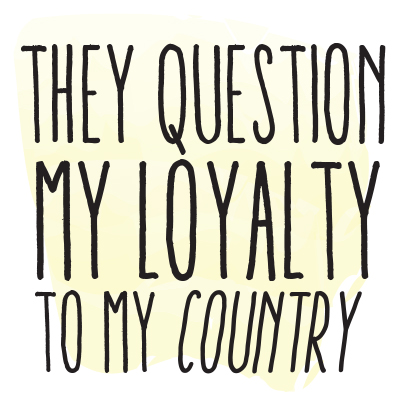

Blake Riojas, 25
Oklahoma City
I am an aerospace engineer working for the US Air Force on a base in Oklahoma City. Several times when going through security gates, I've been asked the same question: "Where are you really from?" I reply the same as you, with my home state, my birthplace, "Oklahoma." One time, after a security guard seemed interested in my lineage, I replied, "Some of my family is from Mexico." "Oh, that's more like it," was his response. That has resonated with me since.
On the off chance they ask me what I do on base, they are even more flabbergasted. I do not have traditional Hispanic features, so maybe this is their interest after reading my last name on my badge. But, the microaggression is still felt.
I sometimes feel as if they are questioning my loyalty to the country I was born, or even questioning my ability to use my degree to protect the men and women that serve. I understand their role is to safeguard the base, but to what degree should they pursue this safety? Do they subconsciously doubt Hispanics or other minorities are capable of defending the United States?
I am reminded of Justice Sonia Sotomayor's words: "To doubt the worth of minority students' achievement when they succeed is really only to present another face of the prejudice that would deny them a chance even to try." The effects of questioning where someone is "really from" are undermining the very dream that makes America so great. Perhaps ending the asking of this question is how we can Make America Great Again.
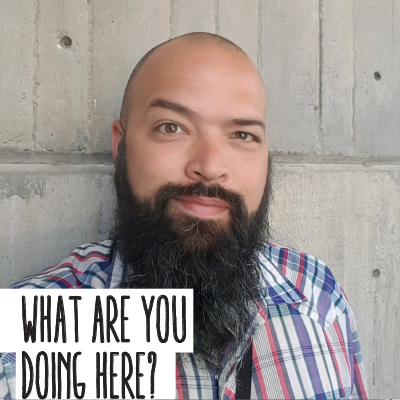

Photo courtesy Randy Mendez
Randy Mendez, 38
Eugene, Oregon
Being asked "Where are you really from?" over and over again starts to feel like the question is really, "So, what are you doing here?" I always say that I was born in Oregon, but my father's from Mexico, since that seems to be what people are usually asking. Nobody ever asks where my mother's from.
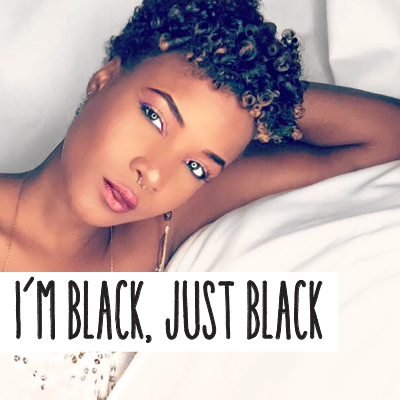

Photo courtesy Destiny Hawthorne
Destiny Hawthorne, 27
Brooklyn, New York
I was born in Detroit and on paper I identify as black. When asked where am I from, saying Detroit isn't good enough. It's always followed up with "where are your parents from?" I reply with the same answer even though I know what the real question is. I'm usually asked after that, “What's your nationality?” When I smile politely and say “black ... just black,” I'm asked again, “But where is your family from?” As if my answer wasn't good enough.
I hate that question. It's like Pandora's box. I have to break down my whole ethnicity because me being black isn't good enough. I have frizzy, curly hair and brown skin with a reddish undertone. I'm mistaken for Dominican often or asked if I'm mixed. I used to be OK with the question because I knew the answer, but over time I’ve started to question myself because people make you feel like it's not the right response.
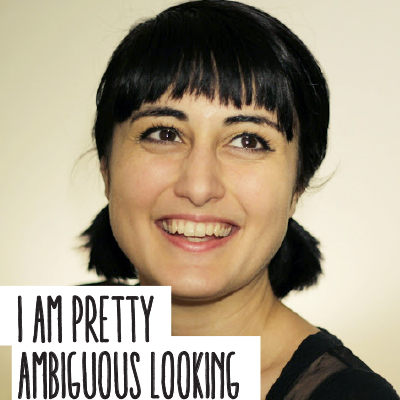

Photo courtesy Samantha Geovjian Clarke
Samantha Geovjian Clarke, 27
Portland, Oregon
My father is Syrian-Armenian, and moved to the US in the ‘70s, and my mother is white of mixed heritage, mainly Scottish and English. I am pretty ambiguous looking racially, though usually other Middle Eastern folks will recognize my features as similar to their own. I grew up with my mother and white stepfather in a very white town (Portland, Oregon, suburbs) and being even a little brown there made you stand out like a sore thumb.
I don't mind talking about my race or my heritage. In fact, it's a big part of my identity and my activism and I enjoy it, but I wish people would just ask me. Sometimes I think they feel like it's more polite to ask ambiguously "where are you from?" or "what are you?" because they're afraid to say race, ethnicity, heritage or nationality – lots of white people don't even know the difference. But they end up being hurtful and displaying deep-seated biases about race by implying I'm not really from America if I'm brown, even though I was born here, or worse, implying that I'm not human because I'm brown (with the "what are you?" question).
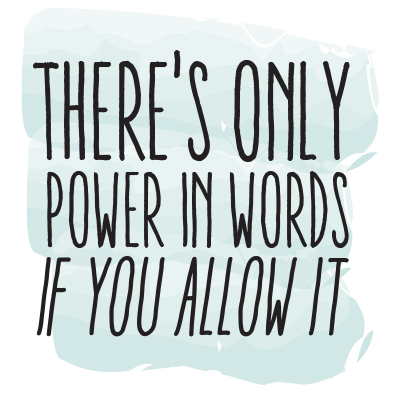

Shannon McNew, 43
Aurora, Colorado
This account contains words that some people may find offensive.
I am half Chinese and half Caucasian. My mother is Chinese and my father is white. However, I actually LOOK like I'm Latina, a Native American or like a Pacific Islander and am mistaken for one of these ethnicities more often than not. My father was in the Air Force and we were stationed overseas. I was 11 when we moved back to the States. When I started attending public school as opposed to DOD schools, I experienced “racism” for the first time.
One day, I came home from school, crying. When my mom asked me what happened, I explained to her that kids were teasing me. At first, they called me a “spic,” but after they found out I was half Chinese, they started calling me a “gook”! My mother said, “The next time someone calls you that, you tell them that gooks are Korean and that YOU are actually a CHINK! If they want to call you names, make sure they at least get it right!”
My mother taught me that there is only power in words if YOU allow it. She taught me that you can't control other people … you can ONLY control yourself and your own actions/reactions. Nowadays, my brothers and I jokingly refer to ourselves as “Chonkys” … half chink and half honky! And, while that may seem like a bad thing to say or to joke about, we don't see it that way. It's “what” we are.
I love when people ask me where I'm from. I don't take a darker interpretation from that question. I take it at face value … I look “mixed” but it's hard to determine exactly “what” the mixture is! Maybe it stems from my own curious nature. Unlike your scenario, it's usually ME asking my Uber driver what THEIR ethnic background is. I've NEVER asked that question so that I can form a judgment about them. I don't ask to offend you. I ask because I'm truly curious!
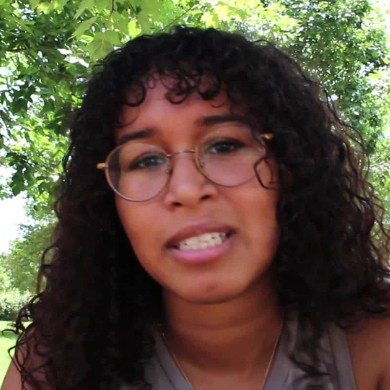
Cameron Buck, 21
Chapel Hill, North Carolina
I am biracial and get asked "where are you really from?" quite often. I, too, see it as a microaggression. My racial ambiguity causes people to feel unsettled when they do not immediately know which label to slap across my forehead and I love it. I love making people feel uncomfortable and causing them to challenge their own preconceptions.
A part of me gets weighed down by my lack of unity or feeling of belonging in any radicalized group, knowing when I walk into a room I will never be part of a majority. However, the optimist in me sees the opportunities: to be able to explore the world without immediately appearing as an outsider, to cause discomfort in a country that seems to be moving backwards, and to start conversations about WHY these microaggressors NEED to know "where I'm from."
When you sit someone down and make them guess your race, most of the time they start to see the problem. When they don't get it immediately, I repeat back to them what they say. "So, since I can move my hips you think I'm Latina? So only Latinas have hip function?" "So, you think I'm not black because of the way I speak? So all black people speak the same?" When you turn the tables, you can show how offensive the question is. Not everyone will see the problem in what they say, but even if you can enlighten one person, you could be saving another racially ambiguous friend out there from that same microaggressor.
I would like to say to all my fellow racially ambiguous friends out there: you are beautiful, you are perfect, and you owe no one an explanation of your identity. You were not born to wear their label. You were not born to fit into their boxes. You were not born to resolve their discomfort.
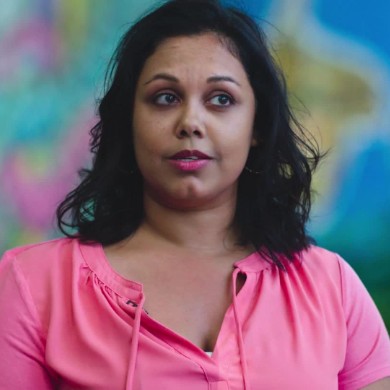
Samantha McKenzie, 37
Simpsonville, South Carolina
I am of Puerto Rican and Guyanese descent, so no one knows what I am. I get asked if I'm Filipino a lot or I just get stared at. When I moved from the Bronx to a small town called Ware Shoals, South Carolina, the town was black or white, no in between. I was the only Hispanic in the high school except for two cousins who made the move at the same time. I was asked, "What color are you?" I literally thought the person was colorblind so I said, “tan,” kind of puzzled. Then someone clarified that the person meant where am I from, to which I answered New York. It’s an interesting encounter that never left me.
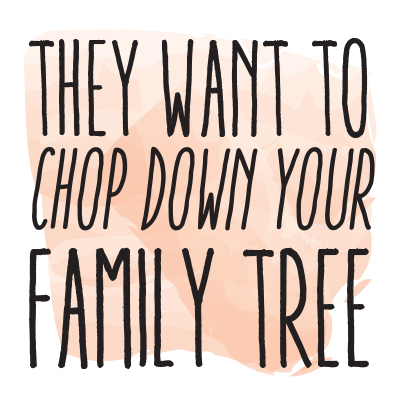

Lydia Dietrich, 37
Los Angeles
Asking "where are you REALLY from?" seems like an innocuous segue, but it's veiled racism. A simple litmus test: Do they ask anything else equally as intimate about your life? Because they're basically expressing a desire to chop down your family tree just to count the rings for their own entertainment. Here’s the real motive: to know what RACE category to file you under in their head.
Ironically, I have experienced this more often than not from "ethnic" types. Apparently if I'm not Aryan, or have lily white skin or a nose that could fit into a bottle cap, then to them I'm not really an American.
Please ask yourself: What makes them PRIVY to such intimate info? This racist rudeness needs to be treated for what it is. If we're SUPPOSED to live in a society where race DOESN'T matter, those who insist on making it matter need to be called on it, otherwise progress in unity in our culture will always be in a state of suspension, if not regression.
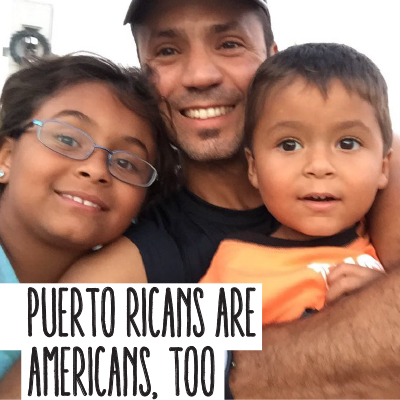

Photo courtesy Rafael Alvarez
Rafael Alvarez, 44
Rockledge, Florida
I am PUERTO RICAN!
Yes, I speak Spanish as my first language. English is my second language.
No Portuguese, no French, no Italian, just Spanish. "Cerveza por favor!" Yeah that one.
No, I don't go to the tanning salon all year round, I am tan NATURALLY!
Yes, I am from Puerto Rico, I am not from New York, Orlando or Kissimmee. I was born and raised in Puerto Rico. Actually went to college there, too.
No New York accent here. Puerto Rican accent. I am from Puerto Rico.
Yes, my family is still in Puerto Rico, where I am from. I didn't bring my family with me. No!
Yes, I am from a very mixed race, a third of my family is white with bright eyes, another third dark skin dark eyes and one-third is pretty mixed like me.
Yes, I was born a US citizen, because Puerto Rico is a territory of the US and every Puerto Rican is a US citizen. No, I don't know what a visa is. I don't need one.
Yes, I travel to Puerto Rico all the time. Yes, I don't need a passport. Yes, we use the same currency! Dollars.
No, I don't know how to make enchiladas. You can ask a Mexican, I am Puerto Rican. We eat rice and beans.
Yes, I can dance salsa because it is part of my culture. I grew up with it.
Yes, I kiss my female friends on the cheek when I see them, again part of the culture.
No, you can't kiss my friends in the cheek. Only I can, because I am Puerto Rican.
No, I am not moving back home, this is my home now.
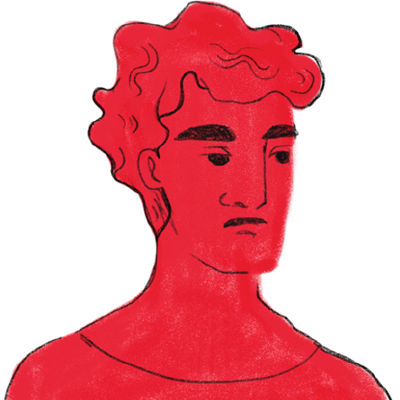

Dave Covarrubias, 36
San Francisco
As a darker skinned Hispanic man from California, being from California is never an acceptable answer when I travel. Even when in California, the fact that I don't speak fluent Spanish seems to be a problem with many people. Yet a majority of people of other ethnicities don't speak their ancestors’ language (German, Italian, Swahili, Gaelic, Mandarin, Farsi, etc.).
I have learned to translate people's questions back to them and say, "You mean what is my background?" Or ask them, "Do you speak (insert language of their heritage)?" and usually they pretty quickly understand their question is extremely presumptuous and ill-informed.
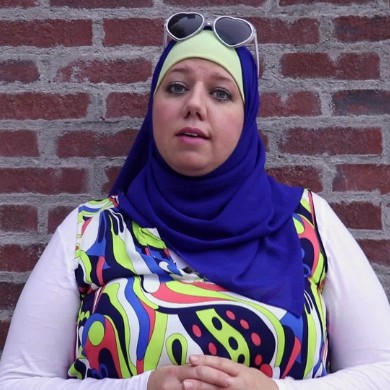
Tara Ijai, 43
Phoenix
As a white American Muslim convert, here’s how the “where are you from?” conversation goes:
Me: NY
Your parents?
Me: NY
Are they Muslim?
Me: No I'm the only one in my family.
Are they OK that you are a Muslim?
Me: Yes, they are quite proud of me and my accomplishments.
Where is your husband from?
Me: Morocco
Oh, is that why you became a Muslim?
Me: Nope I became a Muslim. Then I imported him.
These are typical conversations. After they get past the fact that I am not "foreign," they are sure my husband must have brainwashed me. They don't know me well at all.
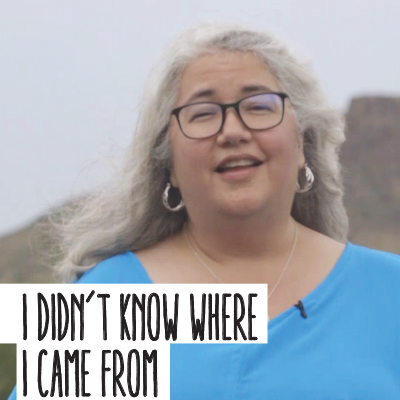

Susan Dunn, 53
Golden, Colorado
I am the adopted child of an average family from Wyoming, but I look nothing like other people in the family or the community where I grew up. I spent my childhood explaining to curious people that I didn't know my ethnicity and listened to their best guesses. My parents refused to tell me anything about my adoption or ethnicity. My mom got to a point that when she was asked by others about my ethnicity, she would say something different every time. She would say French, Italian, maybe a little Native American, or make a joke and move on. This grew wearisome and was hurtful at times. Most people guessed Mexican, being in Wyoming that would make sense. My mom vehemently denied that one!
This year I finally did a DNA test and discovered that I am of mostly European ancestry with a bit of Native American and African ancestry. About one-third of my DNA relatives, especially the ones I am more closely related to, trace ancestry to Puerto Rico. I was over the moon to have this information and connection.
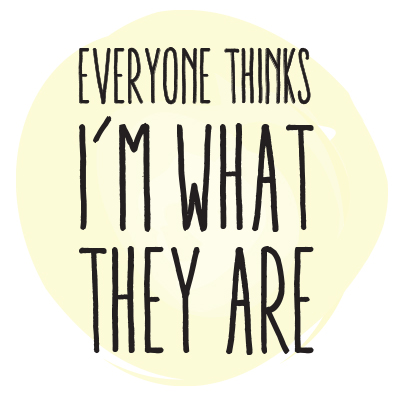

Julie Corralejo, 38
Santa Rosa, California
I am 50% Mexican and for many years I kind of assumed all other Latinos I met were also Mexican. The funny thing is everyone thinks I'm what they are. Jewish people think I'm Jewish. Portuguese people think I'm Portuguese. Italians think I'm Italian, and so on. When someone asks me where I am from I think they are trying to find some way to bond. I'm pretty sure all of those people are just trying to find a way to connect on some level. I refuse to let a few racists prevent me from finding a common ground with the rest of my community.
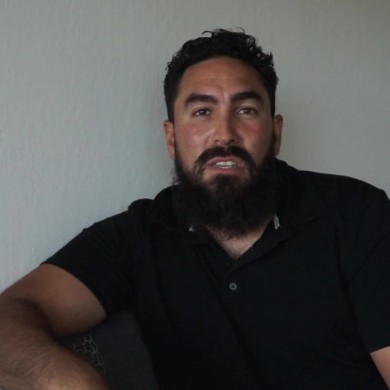
Javier Leocadio Colón, 36
San Francisco
I'm a 36-year-old Puerto Rican and I grew up in Youngstown, Ohio. ALL my life I have been asked, "where are you from?" which is immediately followed up with, "where are you originally from?" and then finished with, "where are your parents from?" When they hear Puerto Rico, there is an audible gasp and they proclaim: "I knew it, you don't sound like you're from here." I hate this so much.
I have never fit in anywhere I go in the USA. I'm constantly pestered and asked about an "accent." Well growing up in Ohio, I thought I sounded like everyone else. But apparently white people can sense I'm different with their powerful cultural ESP (extrasensory perception).
I spoke Spanish and English fluently as a child until my teachers at public school made fun of me. Then I forced myself to speak English. In second grade, they put me in special ed classes, where severely handicapped children went, because I had the ability to speak both Spanish and English, which caused me to have an accent. After one week of no homework, my mom asked me what was going on at school and I told her that they put me in a class with strange kids. My mom attended school with me to discover what they did and immediately took me out of that public school. This is what growing up in America is like. It has never been great.
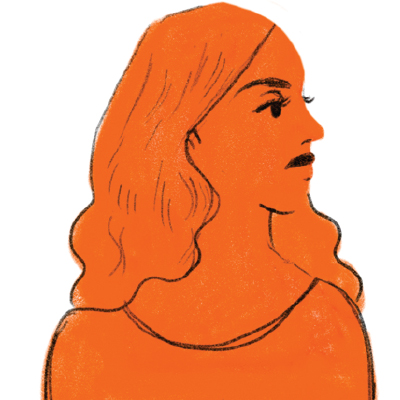

April Blair, 50
Los Angeles
I have been asked "where are you from?" since the second or third grade. The irony is that I am Caucasian. My family’s been here since the 1800s, so I just identified as being American, even though most of my family came from Russia. I always felt like that question had more to do with my darker skin tone than it had to do with really where I’m from.
I felt that this question was implicitly derogatory. I had the unique feeling of being "white" yet experiencing what felt like "You are different, in a negative way, because of your darker skin tone." I am 50 now, and am still asked this excluding question from strangers. Incidentally, I am only asked this question by white people.
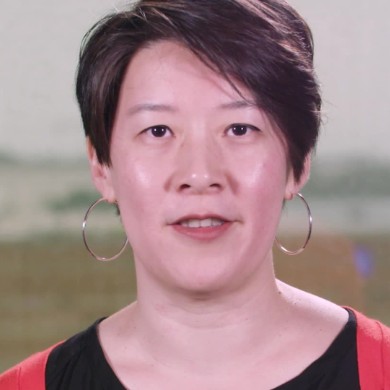
Jennifer Tsien, 45
Washington, D.C.
I'm three-fourths Chinese and one-fourth Latina but people say I look Japanese. I get the "where are you really from?" question ALL THE TIME. I've tried turning it around by asking a white American cashier who greeted me with "Ni hao," where he was "really" from. "Are you British? Polish?" I asked. "Irish," he said. So, I said "slán! That's Gaelic for goodbye." He still didn't get it.
It is always males, though. Which fits my theory that these guys want to know what kind of Asian I am so I'll fit whatever sick sexual fantasy they have about us and that I want no part of.
On the other hand, I had to think about why it bothers me so much. It would be clearly bad if they said, "I hate Asians." Or, "You're not welcome here." On the contrary, they're TOO eager. I guess it destroys my illusion that even though I am indeed Chinese and "ni hao" IS the correct greeting, that people will see me as an individual with race being just a part of my identity that I don't think about much. Unless we're talking food or unless A STRANGER ASKS ME ABOUT MY RACE. Maybe it's like being very tall and people always telling you that you're tall.
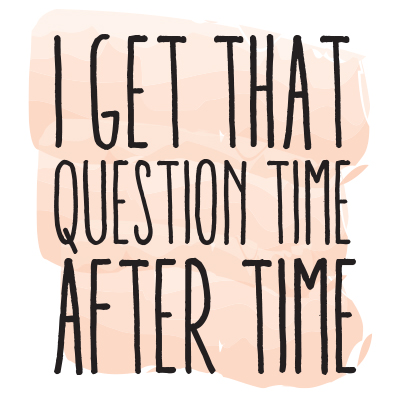

Chris Dalla Buona, 30
San Francisco
I was born in Napoli, Italy. I grew up in a small but beautiful town on the Adriatic Sea in the region of Puglia called Trani. My father is Argentinian, born in Buenos Aires (his grandparents were Italian immigrants, so he holds an Italian passport as well). My mom is American, born in Michigan. They met in Italy, where they lived for almost 40 years. I have lived in the States since 2011. I always get asked that question, where are you from? Does it bother me? Not at all.
I think it's really cool to have different cultures in my ancestry and to have been born in another country. Do I ask that question often? Yes, pretty much if I have a colloquial conversation with someone. I think it's just something curious to ask and I don't think there's anything wrong or racist. I think that some people could get offended but more because they are on the defensive, not because the question is mean or racist. I get asked that question time after time. I always reply with pride and with a smile on my face, “I'm Italian, my mom is American and my dad is Argentinian.”
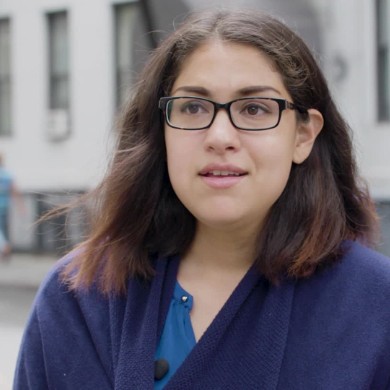
Antonia Obara, 28
Yaphank, New York
At least once a week, I get underhanded comments about being illegal or point blank yelled at to go back to my country. I've got news: This is my country. I am third generation Puerto Rican and original Tex-Mex. What makes it worse is that my daughter looks like she's Irish, with her reddish hair and blue eyes, while I'm brown with brown eyes and black hair. I have been told a few times that she looks adopted or that I must be the nanny.
Contributors: Rose Schmidt, Jordan Mendys, Thomas Brooksbank, McKenna Ewen, Samantha Guff, Ken Tillis, Gabe Ramirez, Karla Liriano, Dylan Novicio-Ablan, Luke Rotzler and Lansing Cai
Design and development: India Hayes and Curt Merrill



